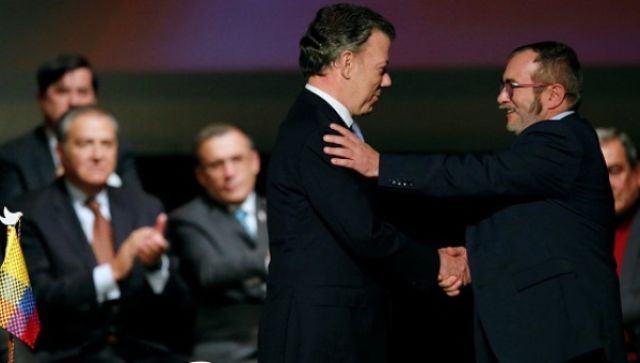
The Colombian government and the left-wing Revolutionary Armed Forces of Colombia (FARC) signed, for the second time, a peace agreement on November 24 that aims to end the country’s 52-year armed conflict. It comes after a previous peace deal was narrowly rejected in a popular vote in October.
President Juan Manuel Santos and FARC leader Timoleon Jimenez, or Timochenko, signed the final text in the capital city of Bogota, in a simple ceremony with the presence of local legislators and human rights activists.
“There will be no more violence between Colombians for political reasons,” said Timochenko. “This simple fact should inspire us to work to make our homeland a much better country.”
Timochenko said the deal was not intended to put aside ideological and political differences, but end the war, insisting: “Today Colombia puts down its weapons.”
Santos said the cost of the conflict was too high and too painful, especially for the families of the disappeared and the injured, adding that this new, better peace deal is definitive.
Santos asked Colombians to put peace before “political interests” — a direct reference to the right-wing opposition that has campaigned against the peace process.
The president said the deal was the first step towards allowing the participation of FARC members in the political process. Santos said that by the end of April next year, all of the FARC’s weapons will be handed over to the United Nations.
Thousands gathered at the main plaza in Bogota, Plaza Bolivar, to celebrate the new agreement.
The first peace accord, signed in September, was rejected by half a percentage point in a plebiscite on October 2 that featured record low voter participation — in part due to a hurricane affecting the country’s Caribbean coast. After further negotiations in Havana, Cuba, the second agreement was reached on November 12.
The peace accord will now go to Congress for debate and a final vote. If passed by congress, it will be included in the Colombian constitution.
Most Colombian political parties support the new agreement and Santos is confident it will pass in the legislative branch.
However, right-wing party Centro Democratico, led by former president Alvaro Uribe, opposed the signing of the new agreement even though the negotiators included several points raised by the “No” campaign.
Uribe has been a strong opponent of the peace talks. He has raised false accusations that the text includes complete amnesty for guerrilla members who committed crimes, and alleging that there would not be reparations for victims of the armed conflict.
[Abridged from TeleSUR English.]